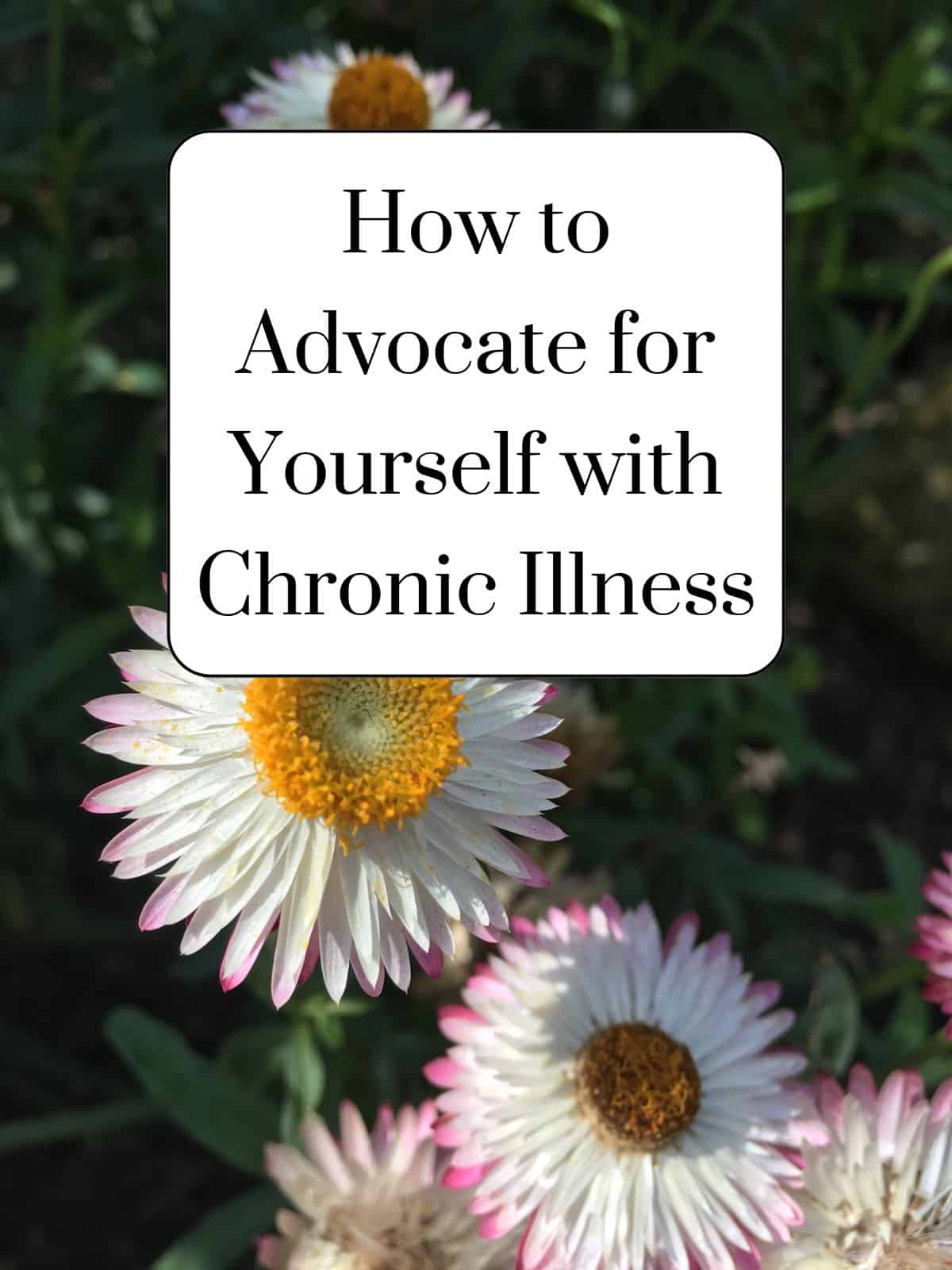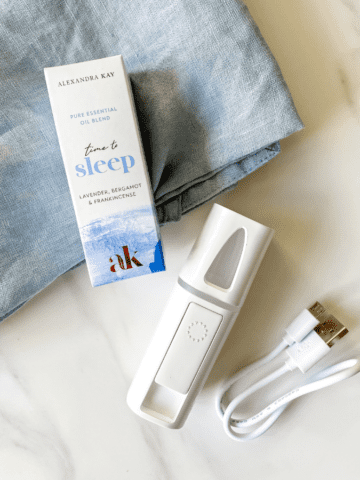How to advocate for yourself when you live with chronic illness - boy, this is something I wish I had known how to do at the beginning of my health journey!
When I first became unwell it happened without warning. One day I was pretty fine, the next I was thrust into my healthcare system trying to work out what was wrong. To begin with I was naive. I went along with whatever the doctor told me, but that didn't always go well . . .

Advocating for myself has now became second nature. Some doctors have been fantastic and referred me to other fantastic doctors. In fact, some picked up on an issue before I even knew I had one! I won't ever forget my cardiologist asking me about my bladder. I wondered what on earth he was talking about, then realised I was answering yes to almost every question he was asking about my symptoms . . .
Other doctors have been less helpful though, and that's where being your own advocate is so important for your care.
This post was updated on 19 January 2022.
Jump to:
- Why should you advocate for yourself?
- Explaining what the 'chronic' in chronic illness is
- How to advocate for yourself?
- 1. Find the best doctor for your condition.
- 2. If a doctor isn't a good fit then move onto someone new.
- 3. Do your research (carefully!)
- 4. Join relevant organisations for your condition
- 5. Consider seeing other healthcare professionals.
- 6. Have a list of questions you wish to discuss with your doctor during an appointment.
- 7. Track your symptoms
- 8. Take a friend or family member with you if it makes you feel more comfortable.
- 9. Grow your confidence.
- 10. Reach out to others in the chronic illness community
- Related posts
- 💬 Comments
Why should you advocate for yourself?
Let's face it, advocating for yourself isn't always an easy thing to do. It can be hard, and nerve-wracking and have me sweating in the waiting room knowing that I may have to be firm about what I want from a difficult doctor who doesn't like their patients asking for anything.
Yet, I also know five things:
1. I am the one who knows my body best, and when it is symptomatic in a way that isn't usual for me.
2. I care most about my health and getting the best treatment possible.
3. I deserve the best healthcare for my condition.
4. Doctors are on a time-crunch, have bad days or haven't read my notes. Sometimes they drop the ball because they are human, and so fallible.
5. Some doctors simply aren't best placed to care for me, and the particularity of my symptoms and conditions.
Explaining what the 'chronic' in chronic illness is
Before being able to advocate for yourself, I think it is important that those close to you really understand what chronic illness really entails. Because, it seems, it is difficult for some people to 'get'.
So how can we explain what the ‘chronic’ in chronic illness really means? I don’t think there is a perfect answer, and let’s face it some people just don’t want to listen or to move away from their preconceptions about health or illness. If that is the case then personally I try and assess how that person relates to me, and whether they really have my best interests at heart.
I find that explaining something in a calm way, and a gentle way is best. Anything overly direct can feel accusatory and the other person can shut down and feel as though they are being criticised by me.
I try and say something really simple, such as chronic means that I will likely live with the condition for the rest of my life and that it affects me on a daily basis. That I am hopeful that medical advances will mean better treatment options in the future, but at the moment I experience symptoms all day and for that reason can’t always do the same kinds of activities as others.
Sometimes I find it helps to give an example that they may be able to relate to more easily. As some of my conditions are fairly rare, it’s difficult for people to understand them. So saying that it is like another condition they may have heard of, in terms of being chronic, may be helpful. Above all, I try and emphasise that it isn’t temporary as a cold or ear infection is, but that it is something I will manage for at least the foreseeable future. With close friends and family I emphasise that their help in understanding would be really supportive and helpful to me.

How to advocate for yourself?
Over time I have learnt how to advocate for yourself when you live with chronic illness - although I am still learning how to navigate situations to this day as new symptoms and conditions arise. It takes time and practice I feel, to advocate for yourself, but I really hope these tips are useful for you.
1. Find the best doctor for your condition.
This is always harder than it sounds unless you are lucky. Yet you deserve the best care and that usually means a specialist for your specific condition. So rather than a general neurologist for example, you want to see a neurologist who specialises in headache / migraine if that is your condition.
2. If a doctor isn't a good fit then move onto someone new.
Each healthcare system is different, but you can usually request a different doctor if the person you are seeing isn't helpful or you feel uncomfortable with their care. A good doctor should always treat you as an individual, listen to your concerns and think about how to manage your care for you as an individual.
If you aren't getting the right care from a doctor there are systems in place in some countries to help you with this. In the UK there is PALS - the Patient Advice and Liaison Service. They can help you resolve problems or concerns you have with your healthcare. I used them myself on one occasion, when a doctor wouldn't send me blood test results for 2 years (yes, 2 years!!).
3. Do your research (carefully!)
Google is a wonderful thing, but only if used in the right way. There is a lot of rubbish online and many dubious websites with talk of 'cures' or the miracle nature of a supplement they are selling. Sticking to national or international organisations is usually best as they are often overseen by a doctor for the information they are putting out.
4. Join relevant organisations for your condition
Most chronic illness conditions have a national association or charity organisations that provide information and help patients with their care. Often they have in-person or Zoom meet-ups and may hold conferences and events where you can learn from specialist doctors, and other health professionals about your condition. This may help empower you to discuss issues with your own doctor.
Some also have patient support groups that you can attend in your area.
5. Consider seeing other healthcare professionals.
As I write in my book Living well with fibromyalgia: a simple guide of health and lifestyle measures for those with chronic illness, other healthcare professionals can be key to helping you manage symptoms - healthcare definitely isn't always just about medication. Physiotherapy / physical therapy, occupational therapy, CBT and seeing a dietician can be so helpful. Asking your doctor about these areas of healthcare, and for a referral if that is how your system works is always a good idea.

6. Have a list of questions you wish to discuss with your doctor during an appointment.
I have found this to be so important and helpful. It's easy to forget the one vital thing you wanted to ask, and only remember it on the journey home . . .
As well as tests and medications, it can also be helpful to ask about relevant supplements and other forms of pain relief as these aren't always routinely mentioned in a doctor's appointment.
Begin early when organising appointments. Some tips:
- Start early, really early. If you need to get hold of paperwork then begin the process weeks in advance. Phone calls may not be answered, messages missed and the post can be slow if it is being sent by mail.
- Be the most polite self you are. Saying please and thank you profusely often gets you far!
- Be the organisation Queen (or King!). If you have multiple conditions then either use dividers in a folder or separate folders. You may want to put tabs on important letters with diagnoses or test results.
- Phone ahead and ask if there is any particular information the doctor likes to have access to.
- Make a list of your diagnoses, symptoms, medications, any relevant past surgeries or procedures and allergies or intolerances. It’s easy to get stuck when asked on the spot. So having it written or typed up is really helpful.
7. Track your symptoms
Tracking symptoms can be really helpful for helping an appointment run smoothly and conveying information to your doctor. I often find that they are appreciative of this too as it helps them make decisions about any further tests and treatment options.
8. Take a friend or family member with you if it makes you feel more comfortable.
They can act as moral support and a second pair of ears. If a doctor is casting doubt on symptoms they can also affirm what you are telling them or remind you of other issues.
9. Grow your confidence.
Growing confidence can be really challenging and even more tricky when you feel unwell and just want some help in finding out what is wrong and managing symptoms.
I was definitely more shy when I became unwell and felt awkward asking questions or even challenging what a doctor said to me on occasion. But then I went back to why I deserved good healthcare and learnt how to stand my ground. Is it always easy? No, it's definitely not. I still have doctors try and tell me my symptoms aren't what they are, or get exasperated when I ask questions.
I feel that growing confidence is something that happens over time, but asking for help from loved ones, writing down questions you want to ask and having a 'goal' for the outcome of a medical appointment can be so useful.
10. Reach out to others in the chronic illness community
One of the best things I did in my health journey was to set up a 'chronic illness account' on Instagram. That may sound strange, but hear me out!
When I was first unwell I felt totally alone and truly lost. I didn't know anyone else with my conditions or similar. I felt weird and odd, and told my mum I was a freak. What an awful thing to say about myself. Part of what transformed my thinking was getting to know other living with chronic illness on my Instagram. We share our experiences, which doctors are brilliant, tips on managing symptoms, celebrate little wins and support each other through difficult days. I don't feel alone anymore and that friendship and support is invaluable.
Social media also relates to advocacy. Talking with others has opened my eyes up to other treatment options that I can ask my doctors about, and given me information that has changed the nature of my conversations with them. At its simplest being part of a community has given me the confidence to ask for what I need for my healthcare to feel as best I can do.
I hope you find those tips on how to advocate for yourself when you live with chronic illness helpful! Please do leave any other tips you have in the comments 🙂
I'm active on Instagram, Facebook and Twitter if you would like to follow along!
Related posts
Clothes and chronic illness: comfortable styles and symptom management
Please follow the advice of your doctor as to all medical treatments, supplements and dietary choices, as set out in my disclaimer. I am not a medical professional, and this post, as well as all other posts on this blog, are for informational purposes only.

















Carole G says
Well done. I laughed at some points because they were so familiar to me. I may have to move in a year or two after being here 15 years and having great doctors. Am saving this article.
Claire says
So hope that you find a good medical team if you do move Carole. It's so important to have that support isn't it.
Shruti Chopra says
I loved this very important list and I'm glad that reaching out to others made it there - it's a favourite of mine. I had endo surgery last year and I learnt so much about pre and post operative care because of this online community.
throughthefibrofog says
This community is amazing isn't it - taught me so much and changed how I access medical care in so many ways!
Sheryl says
Excellent tips, I agree that standing up for yourself is so important as you know your body best, how it's feeling and what it needs together with the right healthcare practitioners.
throughthefibrofog says
I don't think I would have the care I did the past few years without advocating for myself, although not easy at times.
Chronic Mom says
It feels like advocating for yourself is always loaded when it comes to doctors. You have to advocate for yourself (because the doctor won't) but you also have to be really careful how the doctor perceives you. If you advocate too much they feel threatened. I wish it wasn't such a balancing act.
throughthefibrofog says
So true, it really can be that way with some doctors and it's definitely a balancing act. It's always refreshing when I see my doctors who do all the advocacy on my behalf and I barely have to ask for anything.